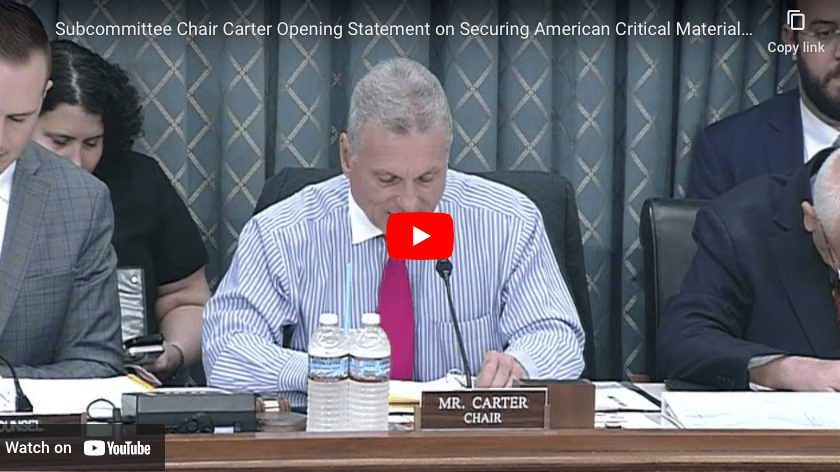Subcommittee Chair Carter Opening Remarks at Hearing on Securing America's Critical Materials Supply Chains
Washington D.C. — House Energy and Commerce Subcommittee on Environment, Manufacturing, and Critical Materials Chair Buddy Carter (R-GA) delivered the following opening remarks at today’s subcommittee hearing titled “Securing America’s Critical Materials Supply Chains and Economic Leadership.”
RUSH-TO-GREEN POLICIES JEOPARDIZE AMERICAN SUPPLY CHAINS
“Critical minerals and rare earth elements are fundamental to modern life, the American economy, and our national defense.
“Cell phones, vehicles, batteries, satellites, renewable energy technologies, missile systems and numerous other products are all reliant on the secure supply of these critical materials.
“Unfortunately, the US supply chain to procure and use these essential materials is, at best, compromised.
“According to the US Geological Survey. The US is 100 percent import-reliant for 12 critical minerals, almost 25 percent of all critical minerals. We also are more than 50 percent import-reliant for another 17 critical minerals.
“Additionally, nearly all of our extracted rare earths are exported to China due to a lack of domestic processing.
“Today we will examine these pressing shortfalls and the opportunities that exist to secure the supply chain for these materials through domestic extraction, processing, recycling and trade with Allied nations.
“We are faced with a choice.
“We can choose to support American development of critical mineral supply chains through sound permitting reforms, strategic investments, and responsible trade.
“Or we can continue the status quo, perpetuating the policies and permitting roadblocks, which will delay the start of new mines, strengthening China's stranglehold on the processing sector and forcing us to turn to the world's polluters and human rights abusers for the critical materials we need.
“We should choose the former and pursue in all-of-the-above strategy for the procurement of these resources while developing and implementing policies to enhance American security.”
UNDERMINING AMERICAN MANUFACTURING
“We must also examine the impact current policies are having on the US economy. We are concerned that the current federal policy direction has put the proverbial cart ahead of the horse.
“Lavish green product mandates and subsidies for technologies that support only those products are sending us headlong into the waiting arms of China, Russia and others in their maligned foreign influence.
“Critical minerals and rare earths are environmentally insensitive resources.
“We should not allow the development of these materials to be further offshored to countries that do not uphold the environmental and labor standards we have in the United States.
“For instance, China's mining district, which contains some of the largest rare-earth mines in the world, has improperly lined tailing ponds that are leaching toxic sludge at a pace of 20 to 30 meters annually towards the nearby Yellow River.”
ENSURING OUR NATIONAL SECURITY
“Not only are policies that offshore our supply chains to China terrible for the environment, but they also place us at a severe strategic disadvantage.
“Last year, China announced it would be suspending exports of gallium, germanium, and graphite to the United States. They followed this up by announcing restrictions on the export of rare earth processing technologies.
“At a time when our national defense stockpile of critical materials has enough supply to meet less than half the demand for military requirements, this is a dangerous situation to find ourselves.
“We must remedy this shortfall and bolster our strategic position to secure our supply chains.
“While mineral recycling and responsible trade presents an opportunity to diversify our procurement, solely relying on these methods is not a substitute for the extraction of virgin minerals domestically.
“Estimates show that recycled quantities of critical minerals from used energy technologies have the potential to reduce future supply requirements by just 30 percent.
“Additionally, the concept of 'friend-shoring' only takes us so far and that goes for processing and refining of these materials, as well as for mining.
“China's average share of foreign direct investment in the countries with the US Free Trade Agreement soared from 4 percent before the passage of the IRA to 31 percent post-IRA and is expected to grow. It is evident that to secure our supply chains for critical materials we must increase dramatically the amount of domestic extraction and processing taking place.
“There's no silver bullet for supplying the critical materials we need. Instead, we must pursue a comprehensive strategy that supports American workers in rewards those who responsibly produce and process these essential products.
“Today we will hear from multiple experts on the state of the critical mineral and rare earths market, which could help shape our thinking on these issues.”
